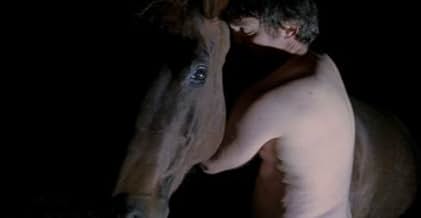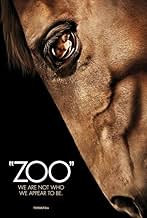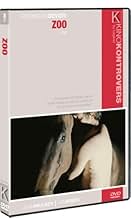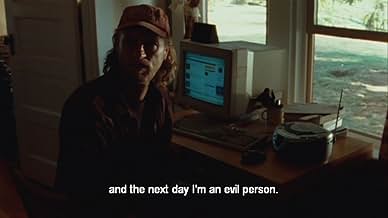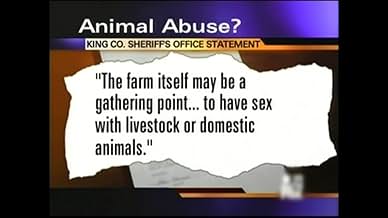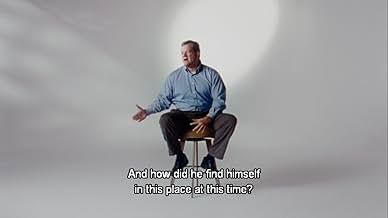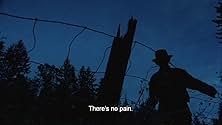NOTE IMDb
5,5/10
3,1 k
MA NOTE
Ajouter une intrigue dans votre langueA look at the life of an Enumclaw, Washington man who died as a result of an unusual encounter with a horse.A look at the life of an Enumclaw, Washington man who died as a result of an unusual encounter with a horse.A look at the life of an Enumclaw, Washington man who died as a result of an unusual encounter with a horse.
- Réalisation
- Scénario
- Casting principal
- Récompenses
- 1 victoire et 5 nominations au total
Forest Fousel
- Capitol Hill Man
- (as Forest L. Fousel)
Andrew Scott McIntyre
- Military Man
- (as Andrew McIntyre)
Michael J. Minard
- Cop #1
- (as Michael Minard)
Avis à la une
I appreciate that the filmmaker is going for more than shock, but I'm not sure what this film really has to offer. It's clear that the filmmaker has some sympathy for the zoophiles, but as a whole, the film is mess. It's beautifully filmed. Almost every frame is mesmerizing, but it feels distracting rather than enlightening. The impeccably filmed images work to mask a lack of insight. Not a terrible film, but the novelty of the subject matter will bring it more attention than it ultimately deserves. It's also derivative. It borrows heavily from Errol Morris. It's probably better than most stuff out there now. At least I saw it instead of Georgia Rule.
The visuals and music of this documentary could have come from an inspirational or motivational movie. Amazingly, it comes from something as estranged as this subject matter. "Zoos", as they're known, is a shortened form for zoophile; they are people who have an amorous and sexual interest in animals.
This documentary delicately approaches the secret lifestyle of those who engaged in this activity at a Washington state horse ranch around 2005. After a rambling start, it ultimately focuses on those who associated with a Boeing engineer named Kenneth Pinyan. He died of "internal injuries" related to "interaction" with a horse.
Just as a good, atmospheric horror movie can put your mind on hold while it glosses over things that you would normally object to, so too does this movie. There's a lot of indirect talking, smoke and mirrors, etc. that get you off your guard and caught up in the beautiful imagery and music... so don't get too carried away with the film-making aspect... remember what it's about.
Subject matter aside, it is a bit long-winded. There's a bit too much dialog (mostly scripted with actors) about each person's generic philosophies. It's OK at first, but then it sounds a bit like pointless rambling. Even though it's an unusual subject matter, I can't really recommend watching this because I'm not sure what you'll get out of it... I'm not quite sure what I got out of it.
This documentary delicately approaches the secret lifestyle of those who engaged in this activity at a Washington state horse ranch around 2005. After a rambling start, it ultimately focuses on those who associated with a Boeing engineer named Kenneth Pinyan. He died of "internal injuries" related to "interaction" with a horse.
Just as a good, atmospheric horror movie can put your mind on hold while it glosses over things that you would normally object to, so too does this movie. There's a lot of indirect talking, smoke and mirrors, etc. that get you off your guard and caught up in the beautiful imagery and music... so don't get too carried away with the film-making aspect... remember what it's about.
Subject matter aside, it is a bit long-winded. There's a bit too much dialog (mostly scripted with actors) about each person's generic philosophies. It's OK at first, but then it sounds a bit like pointless rambling. Even though it's an unusual subject matter, I can't really recommend watching this because I'm not sure what you'll get out of it... I'm not quite sure what I got out of it.
Based on the case of a Boeing employee who died from a perforated colon while being anally penetrated by a horse in Enumclaw, a town in rural Washington state, "Zoo" (the term is short for zoophilia, the sexual love of animals) is a brave attempt to address a highly controversial and polarising issue in a dispassionate way that neither condemns nor sympathises with the people involved in bestiality. The film recreates the events leading up to the man's death and its aftermath in a way that's part documentary / part drama with re-enactments of scenes and emphasising a soft, dream-like mood with delicately muted, wafting music. Director Devor uses four narrators, talking to an unseen listener, to retell the events from the point of view of the people who knew the man, referred to in the film as "Mr Hands", and this approach thrusts (um) the viewer right into the twilight world of zoophiles: how they found each other through Internet contacts, how they organised their tryst and their reactions when the man was injured and when their secret activities became known to the outside world.
The film has the air of a noir mystery: the majority of scenes are filmed in shadow, at night or in dark colours with blue being predominant. The story unfolds slowly and elliptically and anyone who is unaware in advance as to what the film is about may be puzzled at the indirect way "Zoo" tiptoes around the subject until near half-way when a news report drops its headline in deadpan style. The pace is very steady, perhaps too steady and slow, and the film often dwells on several still camera shots which look deliberately staged as if for static display purposes. Close-ups and landscapes often look very abstract with washes of blue across a background; an orchard looks like a misty fairyland beneath a light coating of rain. The mood is even and quite blank until a scene in which police investigators viewing a DVD recording appears; the police react with horror and shock watching the act of buggery and only then do viewers feel something creepy crawl up their spines.
For all its delicacy, "Zoo" gives the impression of something much bigger than its subject matter struggling to make itself seen and heard: the zoophiles give the impression of wanting companionship, a sense of belonging, a need to share something special that gives meaning to their lives, and thinking they have found it. They seek a utopia in which everyone is equal and no-one is judged by how much money s/he earns or how educated s/he is. The places in rural Washington where many of them live look impoverished and some zoophiles may well be drifters or marginalised people barely managing to make a living and survive. (Difficult to tell as many scenes are recreations of actual events with actors playing the zoophiles.) If the film had directly addressed the need of the zoophiles for meaning, for companionship, it might have been able to gain more co-operation from the people involved; as it is, the level of co-operation it got is very restricted. The dead man's family refused to be interviewed for the film which is a pity as the wife and child might have presented him as more well-rounded than he appears in "Zoo".
The film also suffers from subjectivity and could have done with a more objective view of its subject. Interviews with psychologists and psychiatrists on zoophilia and perhaps other conditions such as lycanthropy (identifying oneself as an animal rather than as a human) might have shed light on why some people are sexually attracted to animals and to some kinds of animals in particular. The goals of the project would still be met: the issue would not be sensationalised and viewers might come away with a greater understanding of zoophilia and other bizarre philias. Instead the film can only concentrate on the horse-trainer, Jenny Edwards, who took charge of the horses after the incident became public: she admits that after having followed the case in its detail and ordering one of the horses gelded, that she's "on the edge" of understanding the zoophiles' obsession. It appears also that the director and film-crew were as much in the dark as Edwards was while making the film; even after its completion, the film-makers still were scratching their heads trying to make sense of what they'd done. Not a good portent for a film.
Yes, zoophilia is a difficult subject to talk about, let alone film, without making it look disgusting, degraded or ridiculous and pathetic. "Zoo" tries hard not to take one side or the other but with a subject like this, the attempt to be "balanced" is a tough act indeed to pull off. Some viewers will be irate that the film advocates no position at all, as if it's the film-makers' duty to tell them what they must believe. I think though that to achieve the "balance" that "Zoo" strives for, the film-makers should have pulled back from their subjects and taken a more generalised view of the issue of zoophilia; the police officers, the courts, psychologists and medical who dealt with the dead man and his friends should have been consulted for their opinions about zoophilia.
The film has the air of a noir mystery: the majority of scenes are filmed in shadow, at night or in dark colours with blue being predominant. The story unfolds slowly and elliptically and anyone who is unaware in advance as to what the film is about may be puzzled at the indirect way "Zoo" tiptoes around the subject until near half-way when a news report drops its headline in deadpan style. The pace is very steady, perhaps too steady and slow, and the film often dwells on several still camera shots which look deliberately staged as if for static display purposes. Close-ups and landscapes often look very abstract with washes of blue across a background; an orchard looks like a misty fairyland beneath a light coating of rain. The mood is even and quite blank until a scene in which police investigators viewing a DVD recording appears; the police react with horror and shock watching the act of buggery and only then do viewers feel something creepy crawl up their spines.
For all its delicacy, "Zoo" gives the impression of something much bigger than its subject matter struggling to make itself seen and heard: the zoophiles give the impression of wanting companionship, a sense of belonging, a need to share something special that gives meaning to their lives, and thinking they have found it. They seek a utopia in which everyone is equal and no-one is judged by how much money s/he earns or how educated s/he is. The places in rural Washington where many of them live look impoverished and some zoophiles may well be drifters or marginalised people barely managing to make a living and survive. (Difficult to tell as many scenes are recreations of actual events with actors playing the zoophiles.) If the film had directly addressed the need of the zoophiles for meaning, for companionship, it might have been able to gain more co-operation from the people involved; as it is, the level of co-operation it got is very restricted. The dead man's family refused to be interviewed for the film which is a pity as the wife and child might have presented him as more well-rounded than he appears in "Zoo".
The film also suffers from subjectivity and could have done with a more objective view of its subject. Interviews with psychologists and psychiatrists on zoophilia and perhaps other conditions such as lycanthropy (identifying oneself as an animal rather than as a human) might have shed light on why some people are sexually attracted to animals and to some kinds of animals in particular. The goals of the project would still be met: the issue would not be sensationalised and viewers might come away with a greater understanding of zoophilia and other bizarre philias. Instead the film can only concentrate on the horse-trainer, Jenny Edwards, who took charge of the horses after the incident became public: she admits that after having followed the case in its detail and ordering one of the horses gelded, that she's "on the edge" of understanding the zoophiles' obsession. It appears also that the director and film-crew were as much in the dark as Edwards was while making the film; even after its completion, the film-makers still were scratching their heads trying to make sense of what they'd done. Not a good portent for a film.
Yes, zoophilia is a difficult subject to talk about, let alone film, without making it look disgusting, degraded or ridiculous and pathetic. "Zoo" tries hard not to take one side or the other but with a subject like this, the attempt to be "balanced" is a tough act indeed to pull off. Some viewers will be irate that the film advocates no position at all, as if it's the film-makers' duty to tell them what they must believe. I think though that to achieve the "balance" that "Zoo" strives for, the film-makers should have pulled back from their subjects and taken a more generalised view of the issue of zoophilia; the police officers, the courts, psychologists and medical who dealt with the dead man and his friends should have been consulted for their opinions about zoophilia.
I am puzzled to find so many comments that are positive about this. To describe something so grotesque as "beautiful." I remember hearing something about the actual incident but I had always written it off as urban legend. Now I find that they made a documentary about it. I love documentaries but to make one about the rape of defenseless animals is beyond reprehensible. I tried to find more information on the internet about the actual incident but could find less information than about the movie they made about it. I had never even heard of this movie until now. This is rape people. Not natural in the least. I don't see how anyone is anything but repulsed by this.
Zoo is probably as tasteful a movie as can be, given its bestial subject. For those of you who aren't aware, there's a small population of the world who prefer the love of an animal--both mentally and physically--over the love of a human. This film stylistically recreates the life and death of one horse lover, Mr. Hands, and his pack of animal molesting friends, during one of many meetings and BBQ's in a small town near Seattle. Mr. Hands died from internal injuries, caused by the numerous and repetitive thrusting of the enlarged member of a stallion into his anus.
The film is tasteful because it's not sleazy. In this respect, it's almost worse on the audience because it humanizes these so-called animal lovers. What you'd think would be more like a shockumentary, more than anything else, really becomes a shallow dissection of a zoophile's playful mind. It's certainly not psychological, nor really in-depth; but its shallowness really makes it that much more grim.
As I watched the film, I felt like a voyeur peering into the lives of ordinary human beings doing absolutely bizarre and reprehensible things--and they just talked about it as if it were as benign and workaday as eating a bowl of cereal or taking the dog for a ride (insert pun here). Yet, much like a pedophile talking about his love for children, these zoophile's innocently and sincerely spoke about their love for animals.
Initially concerned about the content of the film, I left the theater without witnessing the exploitation or mockery of bestiality, nor did I see anything graphic or overtly sexual. I did leave the theater a little sickened, however, because I didn't loathe Mr. Hands or his friends. In fact, I somehow sympathized with their pitiful plight.
The film is tasteful because it's not sleazy. In this respect, it's almost worse on the audience because it humanizes these so-called animal lovers. What you'd think would be more like a shockumentary, more than anything else, really becomes a shallow dissection of a zoophile's playful mind. It's certainly not psychological, nor really in-depth; but its shallowness really makes it that much more grim.
As I watched the film, I felt like a voyeur peering into the lives of ordinary human beings doing absolutely bizarre and reprehensible things--and they just talked about it as if it were as benign and workaday as eating a bowl of cereal or taking the dog for a ride (insert pun here). Yet, much like a pedophile talking about his love for children, these zoophile's innocently and sincerely spoke about their love for animals.
Initially concerned about the content of the film, I left the theater without witnessing the exploitation or mockery of bestiality, nor did I see anything graphic or overtly sexual. I did leave the theater a little sickened, however, because I didn't loathe Mr. Hands or his friends. In fact, I somehow sympathized with their pitiful plight.
Le saviez-vous
- AnecdotesThe horse performer in this movie was a Thoroughbred mare named 'Somebodys Baby', and is a former successful racehorse. The horse in the incident portrayed was in reality an Arabian stallion.
- ConnexionsFeatured in Aristokraticheskiy kinematograf: Épisode #1.9 (2011)
Meilleurs choix
Connectez-vous pour évaluer et suivre la liste de favoris afin de recevoir des recommandations personnalisées
- How long is Zoo?Alimenté par Alexa
Détails
Box-office
- Montant brut aux États-Unis et au Canada
- 69 770 $US
- Week-end de sortie aux États-Unis et au Canada
- 7 811 $US
- 29 avr. 2007
- Montant brut mondial
- 69 770 $US
- Durée
- 1h 15min(75 min)
- Couleur
- Rapport de forme
- 1.78 : 1
Contribuer à cette page
Suggérer une modification ou ajouter du contenu manquant


